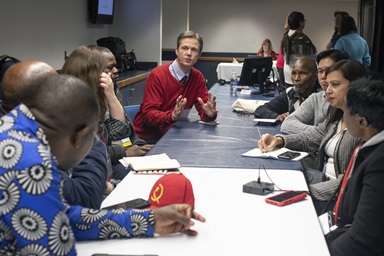When United Methodist Women co-sponsored a celebration last week of a longtime United Nations resolution dedicated to women’s roles as peacemakers, the organization had a specific example to offer as testimony.
Recently, UMW brought together Russian and Ukrainian women at an international location to talk about how to end the conflict between their two countries.
That action is very much the essence of U.N. Security Council Resolution 1325, adopted in 2000 to ensure the full participation of women in the prevention, management and resolution of conflict.
Fifteen years later, UMW joined with other organizations in sponsoring an Oct. 28-30 peace forum marking the resolution’s anniversary at the United Methodist-owned Church Center for the United Nations.
Adding the voices of women
In a session highlighting the dialogue between women of the Ukraine and the Russian Federation, Harriett Jane Olson, UMW’s top executive, noted that she had visited with United Methodists in Crimea. “So when the recent events started to happen, for me it was personal,” Olson added.
Women As peacemakers
Fifteen years ago, Ambassador Anwarul K. Chowdhury — then president of the U.N. Security Council — helped bring global attention to the unrecognized contributions that women make toward peace.
The adoption of U.N. Security Council Resolution 1325 during that U.N. session in 2000 became “my very small contribution to a better world for each one of us,” Chowdhury, who is from Bangladesh, told those assembled Oct. 28 in the chapel of the Church Center for the United Nations.
The occasion was the opening session of a peace forum, sponsored by United Methodist Women and a number of other faith groups and nongovernmental organizations, to commemorate the anniversary of what often is known simply as “1325.”
Crimea, a Ukrainian territory, was annexed in March 2014 by the Russian Federation, which also has supported separatists in eastern Ukraine. Some 1.3 million people, many of them women and children, remain displaced since the conflict began after Ukraine’s political upheaval in 2013.
When United Methodist Bishop Eduard Khegay of the Eurasia Episcopal Area, which includes both Russia and Ukraine, posted a photo on Facebook of church leaders in conversation on the conflict, Olson began to wonder how the conversation could be broader — and how it could include the voices of women.
At a meeting with Khegay and other bishops in Europe, Olson said she learned two things: “One, how complicated the relationships are and how difficult it was for some of the Orthodox churches to participate at all in the conversation, and the second thing was that our other bishops in Europe are giving this a high amount of attention.”
Following conversations with women activists at the U.N. Commission on the Status of Women meetings in New York last March, the idea of a dialogue emerged and the World Federation of Ukrainian Women’s Organizations became a partner.
The federation has provided humanitarian assistance during the conflict, said Martha Kebalo, its main U.N. representative. “At the same time, we have been working to raise awareness about the vulnerability of women in the militarized context, about the need to have women fairly and adequately represented on all levels so they can have really concrete input in to the decisions related to wartime social welfare provisions,” she added.
Talk at grassroots level
Tatiana Dwyer, the UMW executive for global justice, played a key role in bringing the dialogue plan to fruition. As a native of the Republic of Georgia, which has gone through its own series of conflicts since the collapse of the Soviet Union, she had a unique perspective.
“What the dialogue really provided … is the space for grassroots women, for women activists, to get together and to talk about real issues,” Dwyer explained as she moderated the panel.
The dialogue’s two group leaders — Kateryna Levchenko of La Strada Ukraine, the International Women’s Rights Center in Kiev, and Natalia Khodyreva, an activist, academic and psychologist from St. Petersburg, Russia — have known each other since the 1995 Fourth World Conference on Women in Beijing, China. They met again during the March U.N. meetings in New York.
Khodyreva said some women from Russia “felt helpless” because they failed to prevent a war whose status the Russian government has not fully defined. “We women are ready to take responsibility to end this war and to prevent any more war in the future.”
Even more difficult is that the majority of the Russian public supports the government’s role in the conflict. “The truth is that the war has created a deep division in Russian society itself,” she noted.
Such a division did not exist during the two-day meeting sponsored by UMW and the Ukrainian federation, which Kebalo characterized as “a dialogue between broad-minded, good-hearted feminist activist women from two different countries which happen to be neighbors, which happen to be in conflict.”
Quick to recognize their common ground, the women worked on ideas for cooperation.
“We need to develop that direct contact between people, especially to support women’s rights activities in Russia,” said Levchenko, who cited the importance of Resolution 1325 as a tool for conflict resolution.
“From our daily experience, we know that women’s participation is crucial for peacebuilding and conflict resolution,” she stressed. “Women and children suffer disproportionately from military actions and its consequences.”
Bloom is a United Methodist News Service multimedia reporter based in New York. Follow her at https://twitter.com/umcscribe or contact her at (646) 369-3759 or [email protected]
Like what you're reading? Support the ministry of UM News! Your support ensures the latest denominational news, dynamic stories and informative articles will continue to connect our global community. Make a tax-deductible donation at ResourceUMC.org/GiveUMCom.




